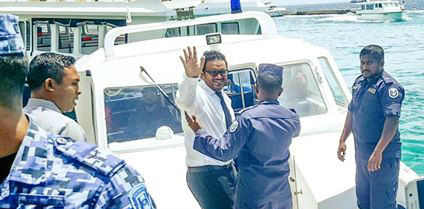Closed hearings for concluding arguments in Adeeb’s boat blast trial
The criminal court refused entry to reporters and members of the public today to observe closing arguments in former Vice President Ahmed Adeeb’s terrorism trials.

07 Jun 2016, 09:00
The criminal court refused entry to reporters and members of the public today to observe closing arguments in former Vice President Ahmed Adeeb’s terrorism trial.
Hearings were scheduled for 11am and 1am in separate trials on charges of abuse of authority and terrorism, both of which stem from the September 28 explosion on President Abdulla Yameen’s speedboat.
Adeeb, who was handed a 10-year jail sentence Sunday night on a separate terrorism charge, is accused of masterminding the alleged assassination attempt.
Sunday’s verdict was delivered in a hearing closed for alleged “national security reasons.”
Become a member
Get full access to our archive and personalise your experience.
Already a member?
Discussion
No comments yet. Be the first to share your thoughts!
No comments yet. Be the first to join the conversation!
Join the Conversation
Sign in to share your thoughts under an alias and take part in the discussion. Independent journalism thrives on open, respectful debate — your voice matters.




